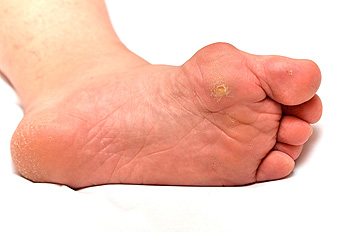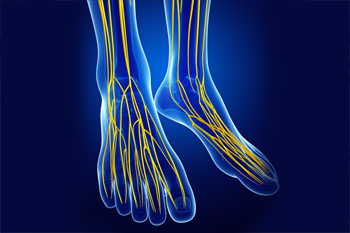Items filtered by date: November 2019
Podiatry As A Career
 The growing need for foot care can be seen in all age groups across the globe. Podiatrists specialize in ailments that affect the feet and ankles, in addition to performing surgery. They generally finish a four year program, followed by completing a hospital residency. The choice of a working environment can range from private practice to long-term care facilities. Research has indicated the number of podiatrists will increase significantly in the future, which may be a result of people becoming more aware of specific foot conditions, and the necessity of receiving proper treatment. If you would like to pursue a career in podiatry, please consult with a podiatrist who can help you to determine if this is a correct career path for you.
The growing need for foot care can be seen in all age groups across the globe. Podiatrists specialize in ailments that affect the feet and ankles, in addition to performing surgery. They generally finish a four year program, followed by completing a hospital residency. The choice of a working environment can range from private practice to long-term care facilities. Research has indicated the number of podiatrists will increase significantly in the future, which may be a result of people becoming more aware of specific foot conditions, and the necessity of receiving proper treatment. If you would like to pursue a career in podiatry, please consult with a podiatrist who can help you to determine if this is a correct career path for you.
If you are experiencing pain in the feet or ankles, don’t join the stubborn majority refusing treatment. Feel free to contact the podiatrists from Associated Podiatric Physicians, PA. Our doctors can provide the care you need to keep you pain-free and on your feet.
What Is a Podiatrist?
Someone would seek the care of a podiatrist if they have suffered a foot injury or have common foot ailments such as heal spurs, bunions, arch problems, deformities, ingrown toenails, corns, foot and ankle problems, etc.
Podiatric Treatment
A podiatrist will treat the problematic areas of the feet, ankle or lower leg by prescribing the following:
- Physical therapy
- Drugs
- Orthotic inserts or soles
- Surgery on lower extremity fractures
A common podiatric procedure a podiatrist will use is a scanner or force plate which will allow the podiatrist to know the designs of orthotics. Patients are then told to follow a series of tasks to complete the treatment. The computer will scan the foot a see which areas show weight distribution and pressure points. The podiatrist will read the analysis and then determine which treatment plans are available.
If you have any questions please feel free to contact our office located in Hamilton Township, NJ. We offer the newest diagnostic and treatment technologies for all your foot and ankle needs.
Read more about What is a Podiatrist?Podiatry As A Career
 The growing need for foot care can be seen in all age groups across the globe. Podiatrists specialize in ailments that affect the feet and ankles, in addition to performing surgery. They generally finish a four year program, followed by completing a hospital residency. The choice of a working environment can range from private practice to long-term care facilities. Research has indicated the number of podiatrists will increase significantly in the future, which may be a result of people becoming more aware of specific foot conditions, and the necessity of receiving proper treatment. If you would like to pursue a career in podiatry, please consult with a podiatrist who can help you to determine if this is a correct career path for you.
The growing need for foot care can be seen in all age groups across the globe. Podiatrists specialize in ailments that affect the feet and ankles, in addition to performing surgery. They generally finish a four year program, followed by completing a hospital residency. The choice of a working environment can range from private practice to long-term care facilities. Research has indicated the number of podiatrists will increase significantly in the future, which may be a result of people becoming more aware of specific foot conditions, and the necessity of receiving proper treatment. If you would like to pursue a career in podiatry, please consult with a podiatrist who can help you to determine if this is a correct career path for you.
If you are experiencing pain in the feet or ankles, don’t join the stubborn majority refusing treatment. Feel free to contact Donald Manger, DPM from Associated Podiatric Physicians, PA. Our doctor can provide the care you need to keep you pain-free and on your feet.
What Is a Podiatrist?
Someone would seek the care of a podiatrist if they have suffered a foot injury or have common foot ailments such as heal spurs, bunions, arch problems, deformities, ingrown toenails, corns, foot and ankle problems, etc.
Podiatric Treatment
A podiatrist will treat the problematic areas of the feet, ankle or lower leg by prescribing the following:
- Physical therapy
- Drugs
- Orthotic inserts or soles
- Surgery on lower extremity fractures
A common podiatric procedure a podiatrist will use is a scanner or force plate which will allow the podiatrist to know the designs of orthotics. Patients are then told to follow a series of tasks to complete the treatment. The computer will scan the foot a see which areas show weight distribution and pressure points. The podiatrist will read the analysis and then determine which treatment plans are available.
If you have any questions please feel free to contact our office located in Hamilton Township, NJ . We offer the newest diagnostic and treatment technologies for all your foot and ankle needs.
Ankle Pain in Runners
 Patients who enjoy running or jogging may possibly be familiar with ankle pain. This is a common injury that can develop during or after running, and can cause severe pain and discomfort. If the ankle becomes inflamed, it can lead to a condition that is known as ankle tendonitis. This can occur as a result of repetitive movements that are involved in running. If the ankle fully extends up or down, a condition that is known as ankle impingement may occur. This may be linked to having weak ankles, which could come from ankle sprains that have occurred in the past. Some patients experience ankle instability, which may be accompanied by swelling and tenderness. If you have ankle pain for any reason, it is strongly suggested that you consult with a podiatrist who can properly diagnosis and treat ankle pain.
Patients who enjoy running or jogging may possibly be familiar with ankle pain. This is a common injury that can develop during or after running, and can cause severe pain and discomfort. If the ankle becomes inflamed, it can lead to a condition that is known as ankle tendonitis. This can occur as a result of repetitive movements that are involved in running. If the ankle fully extends up or down, a condition that is known as ankle impingement may occur. This may be linked to having weak ankles, which could come from ankle sprains that have occurred in the past. Some patients experience ankle instability, which may be accompanied by swelling and tenderness. If you have ankle pain for any reason, it is strongly suggested that you consult with a podiatrist who can properly diagnosis and treat ankle pain.
Ankle pain can be caused by a number of problems and may be potentially serious. If you have ankle pain, consult with the podiatrists from Associated Podiatric Physicians, PA. Our doctors will assess your condition and provide you with quality foot and ankle treatment.
Ankle pain is any condition that causes pain in the ankle. Due to the fact that the ankle consists of tendons, muscles, bones, and ligaments, ankle pain can come from a number of different conditions.
Causes
The most common causes of ankle pain include:
- Types of arthritis (rheumatoid, osteoarthritis, and gout)
- Ankle sprains
- Broken ankles
- Achilles tendinitis
- Achilles tendon rupture
- Stress fractures
- Bursitis
- Tarsal tunnel syndrome
- Plantar fasciitis
Symptoms
Symptoms of ankle injury vary based upon the condition. Pain may include general pain and discomfort, swelling, aching, redness, bruising, burning or stabbing sensations, and/or loss of sensation.
Diagnosis
Due to the wide variety of potential causes of ankle pain, podiatrists will utilize a number of different methods to properly diagnose ankle pain. This can include asking for personal and family medical histories and of any recent injuries. Further diagnosis may include sensation tests, a physical examination, and potentially x-rays or other imaging tests.
Treatment
Just as the range of causes varies widely, so do treatments. Some more common treatments are rest, ice packs, keeping pressure off the foot, orthotics and braces, medication for inflammation and pain, and surgery.
If you have any questions, please feel free to contact our office located in Hamilton Township, NJ. We offer the newest diagnostic and treatment technologies for all your foot care needs.
Read more about Ankle Pain
Possible Ways to Prevent Gout
 If you are experiencing severe pain and discomfort in your big toe, you may have a condition that is referred to as gout. Gout is considered to be a form of arthritis, and typically affects the joints in the big toe. It generally develops as a result of genetic factors, or from eating foods which can include shellfish, red meat, and drinks that are made with excess sugar. When these types of foods are often consumed, uric acid levels may rise in the bloodstream, and crystals can form in the joints. This can cause extreme pain, and in severe cases, it may be difficult to walk. Additional symptoms that are associated with gout can include redness, tenderness, and the affected area may feel warm. There are measures that can be implemented which may help to prevent painful gout attacks. These can consist of incorporating healthy eating habits into your daily routine, and drinking plenty of water. If you are afflicted with gout, it is strongly suggested that you consult with a podiatrist who can help you manage this condition.
If you are experiencing severe pain and discomfort in your big toe, you may have a condition that is referred to as gout. Gout is considered to be a form of arthritis, and typically affects the joints in the big toe. It generally develops as a result of genetic factors, or from eating foods which can include shellfish, red meat, and drinks that are made with excess sugar. When these types of foods are often consumed, uric acid levels may rise in the bloodstream, and crystals can form in the joints. This can cause extreme pain, and in severe cases, it may be difficult to walk. Additional symptoms that are associated with gout can include redness, tenderness, and the affected area may feel warm. There are measures that can be implemented which may help to prevent painful gout attacks. These can consist of incorporating healthy eating habits into your daily routine, and drinking plenty of water. If you are afflicted with gout, it is strongly suggested that you consult with a podiatrist who can help you manage this condition.
Gout is a foot condition that requires certain treatment and care. If you are seeking treatment, contact the podiatrists from Associated Podiatric Physicians, PA. Our doctors will treat your foot and ankle needs.
What Is Gout?
Gout is a type of arthritis caused by a buildup of uric acid in the bloodstream. It often develops in the foot, especially the big toe area, although it can manifest in other parts of the body as well. Gout can make walking and standing very painful and is especially common in diabetics and the obese.
People typically get gout because of a poor diet. Genetic predisposition is also a factor. The children of parents who have had gout frequently have a chance of developing it themselves.
Gout can easily be identified by redness and inflammation of the big toe and the surrounding areas of the foot. Other symptoms include extreme fatigue, joint pain, and running high fevers. Sometimes corticosteroid drugs can be prescribed to treat gout, but the best way to combat this disease is to get more exercise and eat a better diet.
If you have any questions please feel free to contact our office located in Hamilton Township, NJ. We offer the newest diagnostic and treatment technologies for all your foot and ankle needs.
Read more about GoutPossible Ways to Prevent Gout
 If you are experiencing severe pain and discomfort in your big toe, you may have a condition that is referred to as gout. Gout is considered to be a form of arthritis, and typically affects the joints in the big toe. It generally develops as a result of genetic factors, or from eating foods which can include shellfish, red meat, and drinks that are made with excess sugar. When these types of foods are often consumed, uric acid levels may rise in the bloodstream, and crystals can form in the joints. This can cause extreme pain, and in severe cases, it may be difficult to walk. Additional symptoms that are associated with gout can include redness, tenderness, and the affected area may feel warm. There are measures that can be implemented which may help to prevent painful gout attacks. These can consist of incorporating healthy eating habits into your daily routine, and drinking plenty of water. If you are afflicted with gout, it is strongly suggested that you consult with a podiatrist who can help you manage this condition.
If you are experiencing severe pain and discomfort in your big toe, you may have a condition that is referred to as gout. Gout is considered to be a form of arthritis, and typically affects the joints in the big toe. It generally develops as a result of genetic factors, or from eating foods which can include shellfish, red meat, and drinks that are made with excess sugar. When these types of foods are often consumed, uric acid levels may rise in the bloodstream, and crystals can form in the joints. This can cause extreme pain, and in severe cases, it may be difficult to walk. Additional symptoms that are associated with gout can include redness, tenderness, and the affected area may feel warm. There are measures that can be implemented which may help to prevent painful gout attacks. These can consist of incorporating healthy eating habits into your daily routine, and drinking plenty of water. If you are afflicted with gout, it is strongly suggested that you consult with a podiatrist who can help you manage this condition.
Gout is a foot condition that requires certain treatment and care. If you are seeking treatment, contact Donald Manger, DPM from Associated Podiatric Physicians, PA. Our doctor will treat your foot and ankle needs.
What Is Gout?
Gout is a type of arthritis caused by a buildup of uric acid in the bloodstream. It often develops in the foot, especially the big toe area, although it can manifest in other parts of the body as well. Gout can make walking and standing very painful and is especially common in diabetics and the obese.
People typically get gout because of a poor diet. Genetic predisposition is also a factor. The children of parents who have had gout frequently have a chance of developing it themselves.
Gout can easily be identified by redness and inflammation of the big toe and the surrounding areas of the foot. Other symptoms include extreme fatigue, joint pain, and running high fevers. Sometimes corticosteroid drugs can be prescribed to treat gout, but the best way to combat this disease is to get more exercise and eat a better diet.
If you have any questions please feel free to contact our office located in Hamilton Township, NJ . We offer the newest diagnostic and treatment technologies for all your foot and ankle needs.
Ankle Pain in Runners
 Patients who enjoy running or jogging may possibly be familiar with ankle pain. This is a common injury that can develop during or after running, and can cause severe pain and discomfort. If the ankle becomes inflamed, it can lead to a condition that is known as ankle tendonitis. This can occur as a result of repetitive movements that are involved in running. If the ankle fully extends up or down, a condition that is known as ankle impingement may occur. This may be linked to having weak ankles, which could come from ankle sprains that have occurred in the past. Some patients experience ankle instability, which may be accompanied by swelling and tenderness. If you have ankle pain for any reason, it is strongly suggested that you consult with a podiatrist who can properly diagnosis and treat ankle pain.
Patients who enjoy running or jogging may possibly be familiar with ankle pain. This is a common injury that can develop during or after running, and can cause severe pain and discomfort. If the ankle becomes inflamed, it can lead to a condition that is known as ankle tendonitis. This can occur as a result of repetitive movements that are involved in running. If the ankle fully extends up or down, a condition that is known as ankle impingement may occur. This may be linked to having weak ankles, which could come from ankle sprains that have occurred in the past. Some patients experience ankle instability, which may be accompanied by swelling and tenderness. If you have ankle pain for any reason, it is strongly suggested that you consult with a podiatrist who can properly diagnosis and treat ankle pain.
Ankle pain can be caused by a number of problems and may be potentially serious. If you have ankle pain, consult with Donald Manger, DPM from Associated Podiatric Physicians, PA. Our doctor will assess your condition and provide you with quality foot and ankle treatment.
Ankle pain is any condition that causes pain in the ankle. Due to the fact that the ankle consists of tendons, muscles, bones, and ligaments, ankle pain can come from a number of different conditions.
Causes
The most common causes of ankle pain include:
- Types of arthritis (rheumatoid, osteoarthritis, and gout)
- Ankle sprains
- Broken ankles
- Achilles tendinitis
- Achilles tendon rupture
- Stress fractures
- Bursitis
- Tarsal tunnel syndrome
- Plantar fasciitis
Symptoms
Symptoms of ankle injury vary based upon the condition. Pain may include general pain and discomfort, swelling, aching, redness, bruising, burning or stabbing sensations, and/or loss of sensation.
Diagnosis
Due to the wide variety of potential causes of ankle pain, podiatrists will utilize a number of different methods to properly diagnose ankle pain. This can include asking for personal and family medical histories and of any recent injuries. Further diagnosis may include sensation tests, a physical examination, and potentially x-rays or other imaging tests.
Treatment
Just as the range of causes varies widely, so do treatments. Some more common treatments are rest, ice packs, keeping pressure off the foot, orthotics and braces, medication for inflammation and pain, and surgery.
If you have any questions, please feel free to contact our office located in Hamilton Township, NJ . We offer the newest diagnostic and treatment technologies for all your foot care needs.
Why Choose Foot Surgery?
 Many patients choose to have foot surgery performed as an option to relieve severe pain and discomfort. Relief may be found when toenail removal is chosen to correct chronically infected ingrown toenails. Bunion surgery may be a choice to consider if the bunion is painful and unsightly. Research has indicated it is helpful to wear orthotics following a bunionectomy, as this may help to achieve long lasting relief. If pain is felt from a deformed ankle, the surgery that may help diminish the discomfort is referred to as an ankle fusion. Additionally, this type of surgery may help patients who have ankle arthritis, and neuromuscular disorders. If you have foot pain, and are considering surgery, it is strongly advised that you schedule a consultation with a podiatrist who can properly guide you toward making the choice that is correct for you.
Many patients choose to have foot surgery performed as an option to relieve severe pain and discomfort. Relief may be found when toenail removal is chosen to correct chronically infected ingrown toenails. Bunion surgery may be a choice to consider if the bunion is painful and unsightly. Research has indicated it is helpful to wear orthotics following a bunionectomy, as this may help to achieve long lasting relief. If pain is felt from a deformed ankle, the surgery that may help diminish the discomfort is referred to as an ankle fusion. Additionally, this type of surgery may help patients who have ankle arthritis, and neuromuscular disorders. If you have foot pain, and are considering surgery, it is strongly advised that you schedule a consultation with a podiatrist who can properly guide you toward making the choice that is correct for you.
Foot surgery is sometimes necessary to treat a foot ailment. To learn more, contact the podiatrists of Associated Podiatric Physicians, PA. Our doctors will assist you with all of your foot and ankle needs.
When Is Surgery Necessary?
Foot and ankle surgery is generally reserved for cases in which less invasive, conservative procedures have failed to alleviate the problem. Some of the cases in which surgery may be necessary include:
- Removing foot deformities like bunions and bone spurs
- Severe arthritis that has caused bone issues
- Cosmetic reconstruction
What Types of Surgery Are There?
The type of surgery you receive will depend on the nature of the problem you have. Some of the possible surgeries include:
- Bunionectomy for painful bunions
- Surgical fusion for realignment of bones
- Neuropathy decompression surgery to treat nerve damage
Benefits of Surgery
Although surgery is usually a last resort, it can provide more complete pain relief compared to non-surgical methods and may allow you to finally resume full activity.
Surgical techniques have also become increasingly sophisticated. Techniques like endoscopic surgery allow for smaller incisions and faster recovery times.
If you have any questions please feel free to contact our office located in Hamilton Township, NJ. We offer the newest diagnostic and treatment technologies for all your foot and ankle needs.
Read more about Foot and Ankle SurgeryWhy Choose Foot Surgery?
 Many patients choose to have foot surgery performed as an option to relieve severe pain and discomfort. Relief may be found when toenail removal is chosen to correct chronically infected ingrown toenails. Bunion surgery may be a choice to consider if the bunion is painful and unsightly. Research has indicated it is helpful to wear orthotics following a bunionectomy, as this may help to achieve long lasting relief. If pain is felt from a deformed ankle, the surgery that may help diminish the discomfort is referred to as an ankle fusion. Additionally, this type of surgery may help patients who have ankle arthritis, and neuromuscular disorders. If you have foot pain, and are considering surgery, it is strongly advised that you schedule a consultation with a podiatrist who can properly guide you toward making the choice that is correct for you.
Many patients choose to have foot surgery performed as an option to relieve severe pain and discomfort. Relief may be found when toenail removal is chosen to correct chronically infected ingrown toenails. Bunion surgery may be a choice to consider if the bunion is painful and unsightly. Research has indicated it is helpful to wear orthotics following a bunionectomy, as this may help to achieve long lasting relief. If pain is felt from a deformed ankle, the surgery that may help diminish the discomfort is referred to as an ankle fusion. Additionally, this type of surgery may help patients who have ankle arthritis, and neuromuscular disorders. If you have foot pain, and are considering surgery, it is strongly advised that you schedule a consultation with a podiatrist who can properly guide you toward making the choice that is correct for you.
Foot surgery is sometimes necessary to treat a foot ailment. To learn more, contact Donald Manger, DPM of Associated Podiatric Physicians, PA. Our doctor will assist you with all of your foot and ankle needs.
When Is Surgery Necessary?
Foot and ankle surgery is generally reserved for cases in which less invasive, conservative procedures have failed to alleviate the problem. Some of the cases in which surgery may be necessary include:
- Removing foot deformities like bunions and bone spurs
- Severe arthritis that has caused bone issues
- Cosmetic reconstruction
What Types of Surgery Are There?
The type of surgery you receive will depend on the nature of the problem you have. Some of the possible surgeries include:
- Bunionectomy for painful bunions
- Surgical fusion for realignment of bones
- Neuropathy decompression surgery to treat nerve damage
Benefits of Surgery
Although surgery is usually a last resort, it can provide more complete pain relief compared to non-surgical methods and may allow you to finally resume full activity.
Surgical techniques have also become increasingly sophisticated. Techniques like endoscopic surgery allow for smaller incisions and faster recovery times.
If you have any questions please feel free to contact our office located in Hamilton Township, NJ . We offer the newest diagnostic and treatment technologies for all your foot and ankle needs.
Why Live with Pain and Numbness in Your Feet?
Possible Causes of Poor Circulation
 Research has indicated that if you have poor circulation in your feet, it may be indicative of other medical conditions. These may include diabetes, heart conditions, and obesity. It is defined as restricted blood flow to the lower extremities, and there are often noticeable symptoms that are associated with this condition. These can consist of numbness, tingling, and muscle cramps, in addition to pain and discomfort. Nerve damage can possibly be caused by poor circulation, in addition to varicose veins and blood clots. Patients may find relief when specific exercises are performed, and compression stockings are worn that are designed for painful, swollen legs. If you feel you have symptoms of this condition, it is advised that you consult with a podiatrist to learn about the best treatment options for you.
Research has indicated that if you have poor circulation in your feet, it may be indicative of other medical conditions. These may include diabetes, heart conditions, and obesity. It is defined as restricted blood flow to the lower extremities, and there are often noticeable symptoms that are associated with this condition. These can consist of numbness, tingling, and muscle cramps, in addition to pain and discomfort. Nerve damage can possibly be caused by poor circulation, in addition to varicose veins and blood clots. Patients may find relief when specific exercises are performed, and compression stockings are worn that are designed for painful, swollen legs. If you feel you have symptoms of this condition, it is advised that you consult with a podiatrist to learn about the best treatment options for you.
Poor circulation is a serious condition and needs immediate medical attention. If you have any concerns with poor circulation in your feet contact the podiatrists of Associated Podiatric Physicians, PA. Our doctors will treat your foot and ankle needs.
Poor Circulation in the Feet
Poor blood circulation in the feet and legs is can be caused by peripheral artery disease (PAD), which is the result of a buildup of plaque in the arteries.
Plaque buildup or atherosclerosis results from excess calcium and cholesterol in the bloodstream. This can restrict the amount of blood which can flow through the arteries. Poor blood circulation in the feet and legs are sometimes caused by inflammation in the blood vessels, known as vasculitis.
Causes
Lack of oxygen and oxygen from poor blood circulation restricts muscle growth and development. It can also cause:
- Muscle pain, stiffness, or weakness
- Numbness or cramping in the legs
- Skin discoloration
- Slower nail & hair growth
- Erectile dysfunction
Those who have diabetes or smoke are at greatest risk for poor circulation, as are those who are over 50. If you have poor circulation in the feet and legs it may be caused by PAD and is important to make changes to your lifestyle in order to reduce risk of getting a heart attack or stroke. Exercise and maintaining a healthy lifestyle will dramatically improve conditions.
As always, see a podiatrist as he or she will assist in finding a regimen that suits you. A podiatrist can also prescribe you any needed medication.
If you have any questions please feel free to contact our office located in Hamilton Township, NJ. We offer the newest diagnostic and treatment technologies for all your foot and ankle needs.
Read more about Causes, Symptoms, and Treatment of Poor Blood Circulation in the Feet
